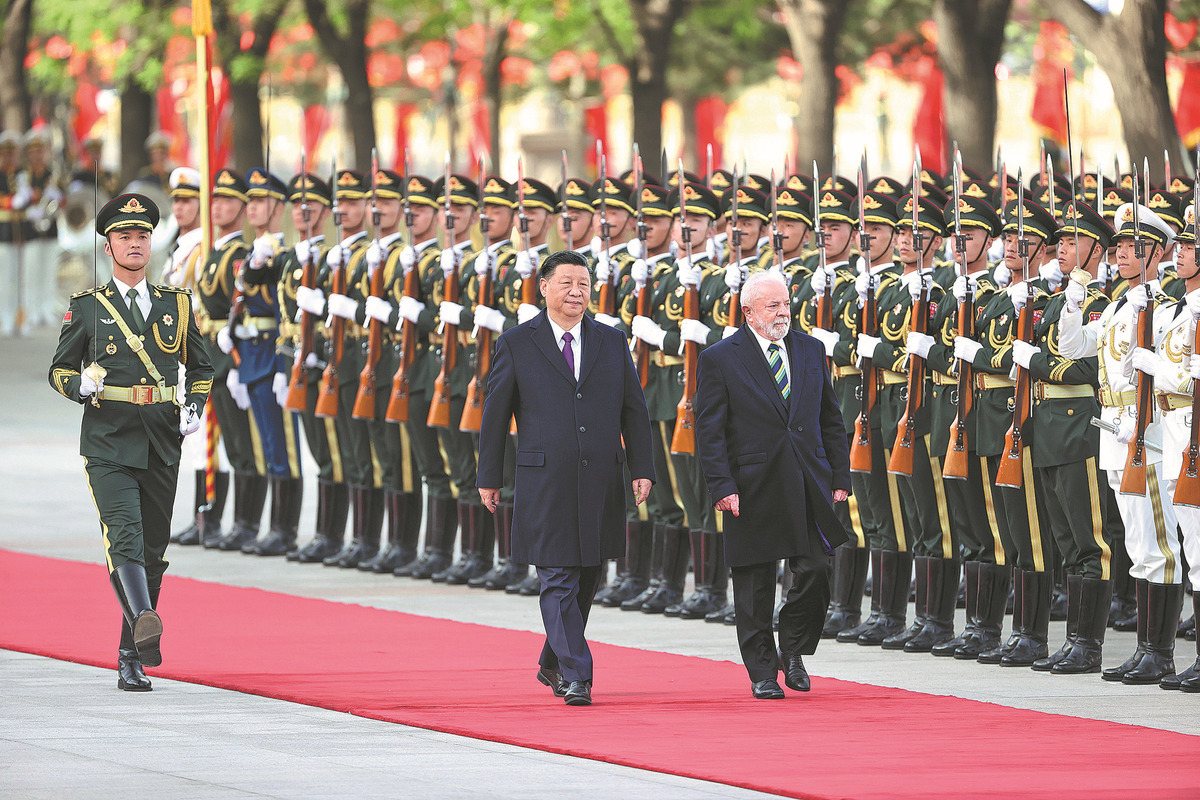Lula visit seen as victory for partnership


Brazil and China can look forward to closer bilateral relations, experts say
The relationship between Brazil and China has been further cemented following President Luiz Inacio Lula da Silva's recent four-day visit to China, analysts say.
It was Lula's first foreign trip outside the Americas since he was installed as president for his third term on Jan 1. In a joint statement issued after he met President Xi Jinping, the two leaders agreed to deepen coordination in multinational bodies such as the BRICS and the G20. The BRICS grouping consists of Brazil, China, India, Russia and South Africa.
Lula's visit is historic because it represents a piece of a more complex puzzle of the world order, said David Castrillon, a research professor at the School of Finance, Government, and International Relations of Externado University of Colombia.
Countries such as Brazil and France have been calling for a multipolar international order in which no one country can impose its voice and its models on the rest of the world, Castrillon said.
Recent visits give support to this argument (of multilateralism) that China has been pushing for decades, Castrillon said, referring to Lula's trip and the recent visit to China of France's President Emmanuel Macron.
The most stable international order is one in which everyone has a voice and in which everyone follows models that correspond with their particularities, he said. "Therein lies the great long-term importance of this visit."
Henrique Reis, international relations manager at the China Trade Center Group in Sao Paulo, said Lula's visit is politically important and shows the world an image of a political partnership between the two countries.
Trade between the two countries is robust and will continue to grow, he said.
China has been Brazil's main trading partner since 2009. Last year China imported more than $89.7 billion of Brazilian products, especially soy and minerals, and exported goods worth almost $60.7 billion to the domestic market.
The value of trade, $150.4 billion, grew 21 times from the time of Lula's first visit to the country, in 2004, the Brazilian government said.
About 20 bilateral agreements were signed during Lula's recent visit, including for the construction of CBERS-6, the sixth in a line of satellites built in partnership between Brazil and China that will help to monitor the Amazon jungle.
"The differential of the new model is a technology that allows the monitoring of biomes such as the Amazon rainforest even when it is cloudy," the Brazilian government said in a statement.
Castrillon said this is just one example of the short-term results of Lula's visit to China, which underscores a comprehensive strategic relationship at the highest level.
Deepened ties
In recent years the relationship has deepened and, with this visit, the two countries have taken an additional step in broadening the foundations of the relationship, which is one of trust and is comprehensive, Castrillon said.
"The two leaders reached agreements in innovative areas, such as 5G, in digital economy issues, in innovation issues, in food security issues, in which tech and innovation are integrated.
"In the short term, this visit takes a step forward in that direction and is a good example of the benefits of this order supported by China and now also by Brazil."
During Lula's visit he stressed that Beijing was essential for the creation of the BRICS, and that the relationship between the two countries has the potential to consolidate a new South-South relationship.
For his part, Xi said this is the first year of comprehensively implementing the spirit of the 20th National Congress of the Communist Party of China.
On this new journey China is striving to enhance high-quality development, accelerate the establishment of a new pattern of development and promote a high level of opening-up to the outside world, which will bring more opportunities to all countries, including Brazil, Xi said.
The writer is a freelance journalist for China Daily.

































